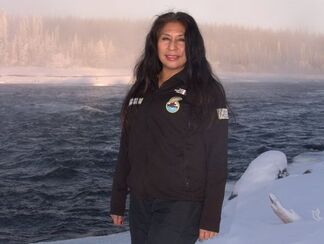 Aileen Drybones has a unique story. She and her sister, Marlene, were raised by their grandparents, Madeline and Noel Drybones. Their main camp was at Kaché (Reliance), though the family spent a good part of each year travelling and living off the land. “We were raised to hunt and trap,” Aileen explains. In the fall time, before the ice formed, Aileen, Marlene, and their grandparents would pack up their snow machine, dog team, tents, gear, and food—they spent the weeks leading up to their departure harvesting fish and berries—and then charter a plane out to the tundra. They were dropped off at different places: Thelon River, Dené Bésda Tué Chogh (Fletcher Lake), Tł'ombálı Tué (Tent Lake), Beaulieu River, Ɂedacho Túe (Artillery Lake), Rabbit Lake, Batsı́z Káltth’ër Tué (Williams Lake), to name just a few. From there, the foursome would work their way back to Reliance, hunting and trapping along the way. The Drybones family truly depended on the land. “We did anything and everything to survive,” Aileen explains. “If you saw a ptarmigan, you didn’t just watch it walk past. That ptarmigan could be your lunch or your dinner.” They trapped marten and mink in the fall, foxes and wolverines in the winter, and beavers and muskrats in the spring. Eileen also remembers harvesting migrating caribou. “We would set up food caches under the rocks to keep the meat good and to protect it from grizzlies. You always need a few caches just in case.” In 2002, Aileen was living in Yellowknife. By this point she had two kids, one in school, the other in daycare. She was using her free time to do some upgrading at Aurora College. One day, she saw a poster on a bulletin board at the college for a taxidermy course. “I dropped what I was doing and took the course. I became a taxidermist.” In many respects, taxidermy was a natural career path for Aileen, who was already skilled at working with fur from hunting and trapping. Aileen loved being a taxidermist—she specialized in canines like foxes and wolves—but after twenty years, she needed a change. For a few years, she took contracts as a culture instructor for schools and non-profit organizations in Yellowknife. “I took kids on canoe trips in big boats and out on snowmobiles. I taught them how to trap, set snares, hunting in winter, reading animal tracks.” She continued to do this kind of work after moving to Łutsël K’é. Then this past year she saw the Thaidene Nëné Department’s posting for guardians. “I love being on the land,” Aileen explains. “The outdoors is home, it’s my happy place. I applied for this job because it allows me to be outside. I also like jobs that are physically demanding. The bigger the challenge, the bigger the reward and the sense of satisfaction.” Aileen joined the Ni Hat’ni Dene crew in July 2023. In addition to spending time outside and the physical challenge of the work, she has liked being part of a team. “I enjoy working with others. It’s not always easy. We have our disagreements, but we are stronger together.” She has also liked the fact that her job is to take care of the land. “I want to keep Thaidene Nëné the way it is. I don’t want exploration, people moving in, tearing up the land, polluting it. Protecting our land, the animals, and our people’s ways of life is super important for our future generations. We depend on the land; we live on our country food.” There are lots of special places for Aileen across Thaidene Nëné, places that remind her of the years she spent living, travelling, and learning with her grandparents. One particularly special place is Ɂedacho Túe. “It’s so beautiful there. One side of the lake is tundra. The other side is bush.” The Drybones family has a cabin where the lake empties into the river. “You can set a fish net right there because the ice isn’t too thick. If you go south from the cabin, you’re in the forest, so you can get wood easily. If you go north, you hit the tundra. You have everything you need. How can you not love it? It feels like the place where God first began." |
AuthorWrite something about yourself. No need to be fancy, just an overview. Archives
July 2024
Categories |
CONNECT |
VISIONWe are the Lutsel K’e Dene First Nation. Our vision for Thaidene Nëné is:
Nuwe néné, nuwe ch'anıé yunedhé xa (Our land, our culture for the future). We’re working with our partners to permanently protect Thaidene Nëné—part of our huge and bountiful homeland around and beyond the East Arm of Tu Nedhé. |
